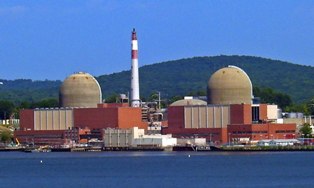US regulator dishes out fines
25 January 2008
Entergy is to be fined $650,000 for being too slow to ensure public warning systems had back-up power at the Indian Point nuclear power plant. Florida Power & Light will face a $208,000 fine over security issues, and BWXT will pay $32,500 for a safety lapse.
 The civil penalty of $650,000 proposed by the Nuclear Regulatory Commission (NRC) for Entergy is ten times the base level for this class of violation. The commission signalled its severe displeasure, saying it had upped the fine to "emphasize the importance of prompt compliance with NRC orders."
The civil penalty of $650,000 proposed by the Nuclear Regulatory Commission (NRC) for Entergy is ten times the base level for this class of violation. The commission signalled its severe displeasure, saying it had upped the fine to "emphasize the importance of prompt compliance with NRC orders."
Entergy's failure at Indian Point was to upgrade the mandatory emergency warning system as required by the 2005 Energy Policy Act. All US nuclear power plants have a ten mile (16 km) emergency planning zone around the plant, complete with a public address system. The 2005 legislation required that any plant with high population density within that zone should have a back-up power supply for the public address system so that it would still work even during a power cut. The improved system also had to have approval from the Federal Emergency Management Agency (FEMA). Of the USA's 65 nuclear power plants, the only one affected was Indian Point, which lies 24 miles north of New York.
In January 2006 the Nuclear Regulatory Commission issued an order to Entergy to confirm that the required changes had been made, allowing one year for the company to do so. In the month of the deadline, Entergy requested and was granted an extension to 15 April 2006, but missed that deadline too. NRC denied Entergy's request for a third deadline and fined the company $130,000.
An NRC statement puts 24 August 2007 as the next deadline set. Entergy missed this as well, saying it had installed and tested equipment, but did not yet have FEMA approval. An Entergy statement today explained that the system was still not operational but it was "working with the four counties surrounding Indian Point, FEMA and the NRC to ensure that the remaining issues will be resolved and the system approved by FEMA as quickly as possible."
Non-functional weapons at Turkey Point
At the Turkey Point nuclear power plant in Florida, firing pins were deliberately removed from response weapons by contract security offiers working for plant owner Florida Power & Light (FPL), putting the nuclear operator in violation of NRC requirements. This was compounded by a failure to inform the NRC within one hour of discovery and follow that with a written report within 60 days.
Furthermore, another contractor then provided "incomplete and inaccurate" information to NRC investigators on FPL's behalf, placing the company in violation of requirements yet again.
A legally binding Confirmation Order was issued to the security contract company, Wackenhut, but no more action was taken against it. In December 2007 Exelon decided to replace Wackenhut workers at all ten of its nuclear power plants after a Wackenhut security guard was caught sleeping at Peach Bottom.
William Johns and Luiz Fernandez of Wackenhut have been temporarily blacklisted from NRC-controlled work, agreeing not to seek such employment before 15 July and 30 June respectively. Johns failed to meet the reporting regulations; Fernandez supplied incomplete and misleading information.
The two workers that actually removed the firing pins, Jon Brumer and Oscar Aguilar, have been banned from NRC-related work for five years.
The NRC has proposed a civil penalty of $208,000 for FPL. Its Region II administrator Victor McCree said: "The NRC will not tolerate actions of this nature. Fortunately we require multiple layers of defence for nuclear power plants."
Criticality risk at Lynchburg
The NRC has proposed a civil penalty of $32,500 for BWX Technologies (BWXT) afer concluding it had not had sufficient controls of criticality risks when using special vacuum cleaners to manage high-enriched uranium (HEU). At Lynchburg, Virginia, BWXT carries out US government work related to nuclear-powered navy vessels. It is one of only two facilities in the country licensed to handle HEU.
On 26 July 2007 a specially-designed vacuum cleaner spilled some HEU solution into an attached plastic bag used for contamination control. The arrangement had not been analysed for nuclear criticality safety.
BWXT explained the incident, took corrective action to prevent reoccurrence and announced a schedule for the work to NRC's satisfaction by 16 November.
The amounts of HEU involved in the incident were small, and there had been no serious consequences, the NRC noted. However, "Under different circumstances in which a sufficient concentration of available HEU had been present, a criticality accide would have been possible." This would have had no effect outside the facility, NRC said, but "could be catastrophic to individuals in the immediate area inside the plant."